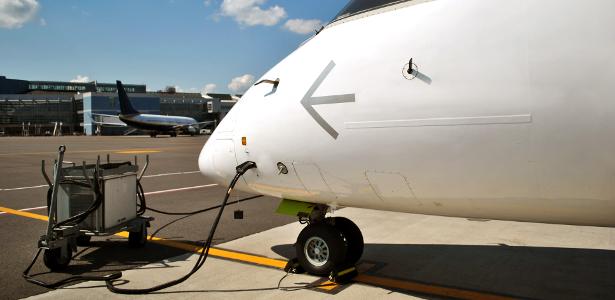Brazil uses the most expensive aircraft kerosene without it, and it will only change now – 11/19/2021
3 min read

Brazil pays more for a type of aviation kerosene that is not needed in our climate and little used in the world. Airplanes here, a tropical country, pay for fuel made to fly in freezing temperatures like those at the North and South Poles. This increases costs unnecessarily and is reflected in the ticket prices for the end consumer.
A flight from Brazil to Europe spends about R$9,000 one way, because of this waste. Last month, the National Petroleum, Natural Gas and Biofuels Agency (ANP) authorized the use of JET-A aviation kerosene, which is cheaper and widely traded on the international market. There is a possibility of a price reduction for the end user, but no one guarantees this or estimates how much the reduction will be.
Until then, only the JET-A1 type was used by Brazil, the fuel used to transport flights at extremely low temperatures, such as in Antarctica, for example. JET-A1 has a maximum freezing point of -47°C, while the JET-A has a maximum freezing point of -40°C.
The decision of the National Ports Agency provides for coexistence between the two fuel (JET-A and JET-A1), which stimulates competition between kerosene that can be imported or produced in the country’s refineries. Aviation kerosene (QVA or JET) is preferred for large aircraft, while jet gasoline is used for small aircraft.
According to the Brazilian Airlines Association (Abear), The price of aircraft kerosene increased by 91.7%. In the second quarter of this year compared to the same period last year.
For the Secretary of Civil Aviation at the Ministry of Infrastructure, Ronnie Glanzmann, Brazil’s choice of the JET-A1 was made “several years ago” (he was unable to say how long). The choice is not natural because the country has a tropical climate and is one of the few countries in the world to adopt the fuel, which is a premium.
The price difference
“The price difference should be $0.02 per gallon, which is 0.03 Brazilian real per liter,” he told the column. “There’s still a bit of savings left, but any penny helps.”
According to the secretary, fuel accounts for 30% to 40% of the cost of the trip. “It’s a very important component,” he says.
Although it appears to be a small difference in price, the savings of R$0.03 per liter are significant, Glanzmann says.
He cites as an example a flight from Brazil to Europe, which used about 300,000 liters of kerosene. Changing the fuel type will save Rls 9000.
The Rio-Brasilia route, which is just over 1,000 kilometers long, uses 20,000 to 30,000 liters. In this case, the savings will be between 600 and 900 R$ per extension.
“Aviation doesn’t work if it doesn’t have good fuel,” says Glanzmann.
PIS and Cofins تخفيض Reduction
The Ministry of Infrastructure, in early 2020, just before the pandemic, instituted a decree that changed the Personal Information System (PIS) and Cofins and, based on wallet accounts, could generate savings from R$0.08 to R$0.10 per liter.
“The Ministry of Infrastructure intends to abolish these taxes, but we understand that it is not so easy for the Ministry of Economy,” he says.
According to the secretary, in 2019, the government collected R$350 million from PIS Group and Cofins from the aviation sector.
The ministry has also sent to the government a proposal for a temporary measure to reduce Cide’s duties on aircraft gasoline. “It’s fuel for small planes, and the tax credit is about R$25 million,” he says.
Non-tourist effect
The government expects that the introduction of cheaper fuel will allow to reduce the cost of airlines in the country and, accordingly, reduce ticket prices.
Tourism Minister Gelson Machado Neto, in a statement, said that the increased supply of aviation kerosene in the country would help expand tourism in the country.
“This measure reduces the so-called cost of Brazil and benefits airlines, but above all it favors the tourist consumer by reducing ticket costs, which is expected from now on,” he said.
The minister did not say whether there was actually a drop in the ticket price and what the estimate was.

“Entrepreneur. Music enthusiast. Lifelong communicator. General coffee aficionado. Internet scholar.”



